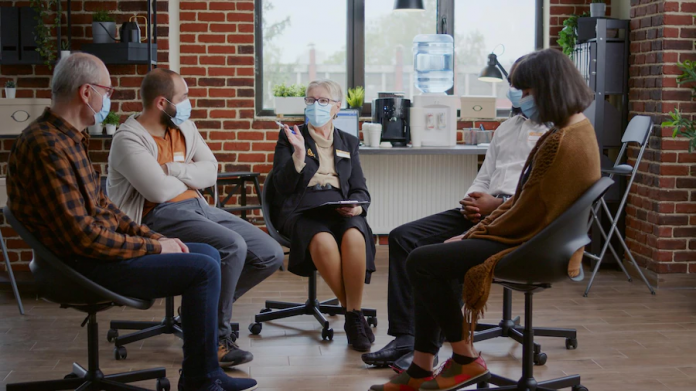Being surrounded by love and support gives life its greatest meaning. Having a community helps to manage difficult situations, overcome obstacles, and improve daily life. Spending time with others has a positive impact on our mental and physical well-being. The support we provide to and receive from our social network has the power to drastically alter our lives. Having friends who are facing the same difficulties as you can provide support and a sense of community.
Similarly, peer support groups for addiction rehabilitation refer to group meetings where people go through similar challenges to share, listen, and talk. These groups are purposefully nonprofessional and nonclinical. Attending addiction support group sessions increases the odds of long-term recovery. Alcohol and drug support group sessions are held daily in most US cities and towns. Over 5,000,000 Americans attend addiction support groups annually.
Group Treatment Vs Addiction Support Groups?
Participants in addiction support groups are able to listen to one another’s stories, find validation, ask questions, and discuss problems without fear of stigma or criticism. With this support system, addicts have the freedom to choose how they want to recover. The peer counselor or group leader is not the only one who may impart knowledge to the group. Sessions are confidential, and members provide mutual assistance outside of scheduled times. Free meetings should never be taped. Whatever addiction Treatment Services you choose, make sure it is affordable and effective with your body-mind.
Group therapy addresses addiction and mental health difficulties in a group setting. Therapists, psychiatrists, and psychologists lead therapy groups and preserve records according to professional health system requirements. Group psychotherapy may be combative to help participants face and resolve their concerns, unlike support groups. Group therapy is a professional psychiatric treatment reimbursed to insurance providers.
Addiction Peer Support Benefits
1. Decrease Drug And Alcohol Usage
Peer support in addiction therapy helps to reduce drug and alcohol use, as per research. The study notes that both mentors and mentees in a specific program were proven to have significant reductions in their substance use, and were able to fully maintain sobriety both during and after the program.
2. Stick With The Treatment
Peer support not only reduces substance usage but also enhances the likelihood that an individual will stick with a treatment program all the way through. More patients completed the program with socially integrated treatment modalities than with those that did not include peer groups.
3. Learn New Skills From Others’ Experiences
In addiction support groups, you’ll meet a diverse range of people, which creates a wealth of experience to draw from. Nearly all group participants will have a toolbox of coping mechanisms that they have developed through trial and error over the course of their recovery, and they can share what they have discovered with you. Sometimes learning by example comes from simply hearing about other people’s experiences.
4. Have A Emotional Support
You can stay strong in recovery by having a group of people you can lean on and confide in. You can express your emotions and talk about difficult life issues with people who have firsthand experience coping with the same things. When someone does provide advice, you know it’s coming from someone who has “been there” too. Sometimes just talking about your problems out loud is enough to prevent a crisis situation.
5. A Sense Of Accountability
Other forms of treatment cannot provide the same sense of accountability that a community does. Because of the social obligation to abstain from drugs and alcohol, peer support in addiction recovery is special. Positive pressure that results from wanting to see the people you care about live happier lives drives this pressure. As you work towards sobriety together, it will genuinely seem like a team effort.








